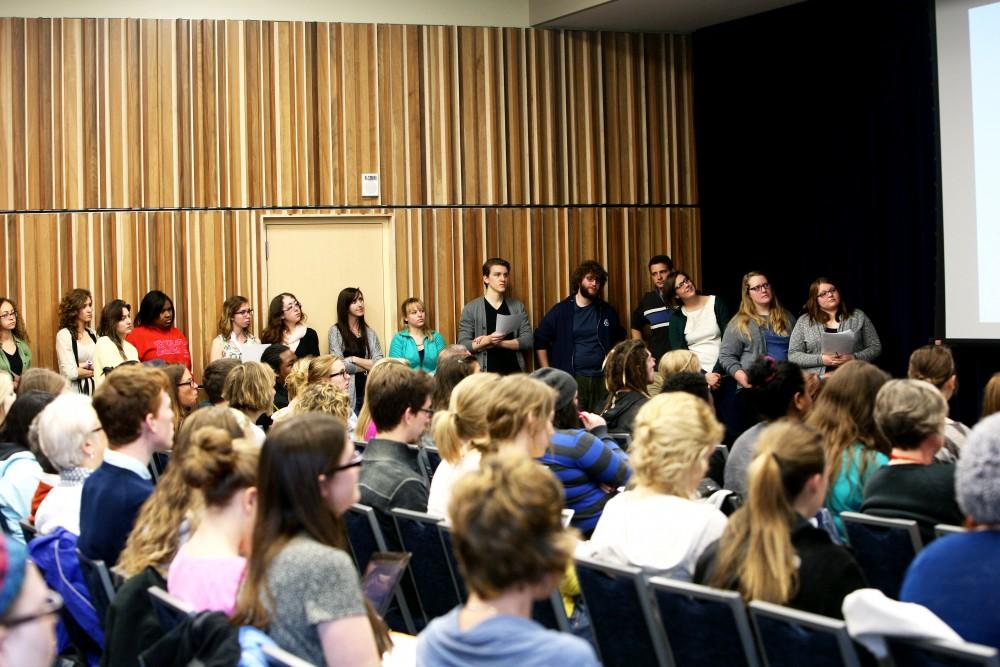Teach-In starts dialogue on social justice at GVSU

GVL / Emily Frye
Apr 6, 2015
Originally published 4/6/15
The Grand Valley State University Student Senate and the University Academic Senate came together on Thursday to host the second annual Teach-In, an all-day event with 26 sessions for community members to attend. This year’s event, titled “Power, Privilege and Difficult Dialogues,” brought about 1,150 people to the Mary Idema Pew Library and the Kirkhof Center on the Allendale Campus, and to the Loosemore Auditorium in Grand Rapids.
Karen Gipson, chair of the executive committee of the University Academic Senate, said the idea for the Teach-In stems from a Martin Luther King Jr. quote: “Whatever affects one of us directly affects us all.”
“We’re all part of the same community – of GVSU, of Michigan, of the U.S. and of the world,” Gipson said. “It’s crucial to see the consequences of our behaviors, words and even our thoughts. When we see, we have the option of making informed choices; without seeing, it’s as if we’re stumbling around in the dark.”
Gipson added that having the sessions in multiple locations was new this year. Although Gipson said the event may have been too spread out, she thought it was valuable to host it downtown.
“I think it was a meaningful experience for everyone who came,” she said. “The evaluations showed that the vast majority of attendees were interested in having another Teach-In. I’d personally like to see the Teach-In grow into a yearly event that involves the entire campus community.”
Student Senate President Andrew Plague agreed with Gipson that the Teach-In should continue next year.
“I am confident that the Teach-In will continue and grow over time,” Plague said. “…the attendance was not as high downtown; however, it’s important to give that time to grow. We want to make sure that we are reaching everyone.”
Plague said the event was meaningful for him because he was part of a team effort, which provided a learning opportunity outside the classroom.
“It’s great to see how interested students, faculty and staff are in participating,” he said. “There is a lot of knowledge on our campus to be shared as it relates to issues of privilege, power and how we reach an inclusive and just world. Opportunities to bring people together to discuss these issues are crucial to our values as an institution.”
Vice President for Inclusion and Equity Jesse Bernal gave a talk called “Understanding and Responding to Unconscious Bias” in the library. Bernal focused on why diversity in higher education is important and outlined three social justice concepts: the subordinate/oppressed versus dominant/privileged, privilege/oppression and individual/institutional systems.
“When we talk about bias, we are most likely talking about the individual,” Bernal said. “But, we should also focus on the institutional.”
He also explained the current state of diversity at GVSU, saying that the approach “includes multiple identities” –whether race, gender or sex – which intersect to form a person’s social identity.
In the fall of 2014, the university’s population was 83 percent was white and 12 percent people of color. The population of what Bernal called “underrepresented minorities” – such as American Indians, Blacks and Latinos – was even less.
Everyone carries their own personal biases with them. Bernal said people need to be more aware of these implicit biases, at both an individual and institutional level.
“It’s important to know where we’re headed, where we should be headed and where we’d like to go,” Bernal said. “We have a responsibility as a university of higher education to shift and transform traditional decision-making bodies.”
Theresa Rowland, the interim Title IX coordinator, presented on “Title IX and Gender-Based Violence” with sociology professor Mary de Young. Rowland explained that the policy helps “eliminate a hostile environment” and allows students to feel safer at their university, especially if they choose to report the incident.
Rowland also addressed the interim sexual assault policy, which emerged in November to define sexual assault as “intentional contact.” She emphasized if no consent, whether verbal or non-verbal, was given, it may be considered sexual assault.
There are three ways in which a case can be processed, Rowland said. A criminal investigation by the police looks at the evidence, while Title IX remains on the GVSU campus and looks at the incident as a justice issue. The third option is to use both methods.
The American legal system, as noted by de Young, “hasn’t changed much except that it’s more deeply buried,” meaning that it is becoming harder and harder to get justice by solely relying on the first option.
Rowland added that the Women’s Center in the Kirkhof Center is available to help anyone who has been in a bad situation. Students who live on campus can also talk to their resident assistants for support.
“I am challenging bystanders to do something about it,” Rowland said. “I want you to support your friends and change the culture on campus.”
According to the Teach-In website, the event aims to educate and foster dialogue among students, faculty and staff, as well as raise awareness on topics such as inequality and oppression. The sessions also cover social justice and ways in which people can get involved to stop bias from occurring.
During Thursday’s event, attendees could pick up a schedule that included basic rules for behavior. Participants were encouraged to be respectful, avoid generalizations, listen attentively and create a safe environment through dialogue. Also stressed was the idea that not everyone has to agree, but they should take away a better understanding of others’ experiences and opinions.
Other sponsors for the Teach-In included the Dean of Students Office, Division of Inclusion and Equity, Milton E. Ford LGBT Resource Center, Office of Multicultural Affairs, Pew Faculty Teaching and Learning Center and the Women’s Center.
For more information about the event, visit www.gvsu.edu/teach-in/.





















